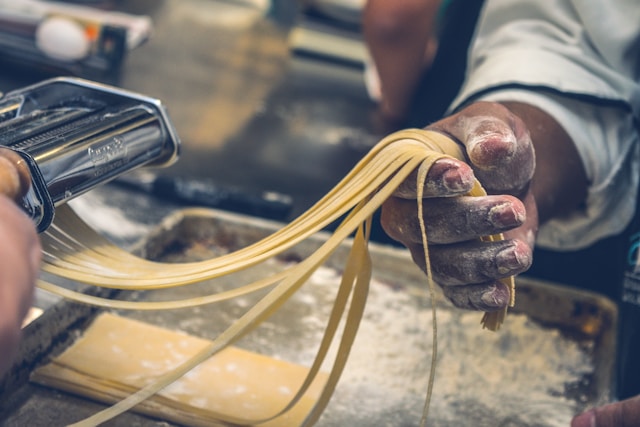Finding the Right Culinary School for Your Career Goals

Choosing the right culinary school curriculum is crucial for a thriving career in the culinary world. Those aspiring to be chefs or start food businesses have a variety of choices, each with distinct opportunities and skills to offer. Aligning your educational path with your long-term career ambitions is essential in picking the best program.
When evaluating culinary school programs, review the curriculum, industry connections, and options for practical experience. Some schools focus on specific cuisines or techniques, while others provide a broader culinary education. For those needing flexibility, an online culinary program in the U.S. might be ideal, enabling students to balance their studies with other commitments.
Reviewing course offerings, faculty expertise, and the success of past students is vital for making a well-informed decision. By identifying your objectives and comparing them to the features of different culinary options, you’ll be better prepared to make decisions that will lead to success in the kitchen.
Key Points to Remember
- Align your culinary education with your specific career objectives and personal interests.
- Evaluate programs based on their curriculum, industry connections, and opportunities for practical experience.
- Consider aspects like flexibility and specialization when choosing a culinary education program.
Determining Your Culinary Career Goals
Defining your culinary career goals and understanding the various educational paths available are key steps in selecting the most suitable culinary school program. This process involves identifying your career goals, exploring different curriculum options, and researching specific areas of the culinary industry.
Defining Career Goals
Start by clarifying your future culinary ambitions. Are you aiming to become an Executive Chef, Restaurant Manager, or Food Writer? Consider the type of work environment that appeals to you, be it fine dining, hotels, or catering companies.
Outline the skills you want to acquire and the roles you envisage taking on in five, ten, or twenty years. This will help you determine which educational paths to pursue and select a program that supports your aspirations.
Research the salary and job growth potential for different culinary careers. This information can guide your decisions regarding your education and career investment.
Understanding Culinary School Programs
Culinary schools provide a variety of programs to meet diverse career needs and time commitments. Common options include:
- Certificate programs (6-12 months)
- Diploma programs (1-2 years)
- Associate degree (2 years)
- Bachelor’s degree (4 years)
Certificate and diploma programs tend to focus on practical culinary skills, while degree programs often include aspects of business management and advanced culinary techniques.
Compare curriculum content, program length, and internship opportunities. Seek programs offering specializations that align with your career goals, such as baking, pastry arts, or international cuisine.
Exploring Culinary Specializations
Identify specialized areas within the culinary field that pique your interest. Some popular specializations include:
- Pastry and baking
- Farm-to-table cuisine
- Molecular gastronomy
- Food styling and photography
- Culinary nutrition
Assess each specialization’s career outlook, necessary skills, and working conditions. Consider taking related culinary classes or speaking with professionals in these fields to gain insights.
Find culinary schools that provide courses or specializations in your areas of interest. Some institutions offer opportunities to study abroad or complete internships in specialized culinary environments, which can be advantageous for gaining expertise in specific areas.
Evaluating Important Factors in Culinary Education
Selecting the right culinary school means carefully considering several key factors that can greatly influence your educational experience and future career opportunities in the culinary industry.
Considering Location and Available Opportunities
The location of a culinary school significantly affects your learning experience. Urban settings often feature diverse culinary scenes and internship opportunities, whereas rural areas may provide unique farm-to-table experiences.
Choose schools in culinary hotspots to enhance networking opportunities. Some schools have partnerships with local restaurants or hotels, offering valuable hands-on training.
Externship programs can be instrumental. Look for schools that provide externships in respected establishments. These opportunities can lead to job offers and professional connections.
Evaluating School Reputation and Environment
The school’s reputation can greatly affect your future career prospects. Understand its standing among industry professionals and alumni.
Accreditation is crucial. Make sure the school is recognized by reputable culinary organizations. This ensures educational quality and can impact future career opportunities.
Examine the school’s mission and values. Do they align with your personal goals? Consider the campus culture and community. A supportive environment can enhance your learning experience.
Evaluate the faculty’s expertise and industry connections. Experienced instructors can provide valuable guidance and support with job placement.
Preparing for the Financial Investment
It’s a significant financial commitment. Research tuition, fees, and additional expenses such as equipment and uniforms. Compare costs between vocational schools, community colleges, and top culinary institutions.
Investigate financial aid options. Many schools offer scholarships, grants, and work-study programs. Federal student loans may be available for eligible students.
Consider the return on investment. Higher tuition fees might be justified if the program has a strong job placement record or relevant industry ties.
Factor in living expenses, particularly if relocation is required. Some schools provide on-campus housing, while others may require you to find your own accommodations.
Choosing the best culinary school curriculum requires a thorough examination of both your professional goals and personal aspirations. Prospective students should consider program curriculum, specializations, and practical training options. Investigating industry connections, internship opportunities, and alumni success stories can provide valuable insights. By aligning educational choices with long-term career goals, future culinary experts can set themselves on a path to success in this dynamic and exciting field.



